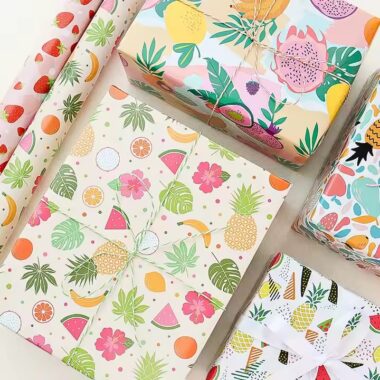Introduction
For retailers, food brands, and wholesalers, packaging is more than just an accessory — it is a direct reflection of brand image. Wrapping paper plays an especially important role because it is often the first thing a customer sees when receiving a product. When orders involve thousands of rolls or sheets, the only way to guarantee consistent quality is through strict factory-level quality control. In today’s competitive market, working with a professional wrapping paper factory ensures not just supply but also reliability and confidence.
📌 1. Why Quality Control Matters in Wrapping Paper
In bulk production, even a small printing error or material defect can affect thousands of units. Poor color consistency, incorrect GSM, or uneven cutting can lead to wasted stock and unhappy customers. This is why global buyers demand robust QC systems when selecting a wrapping paper supplier. Effective quality control protects both the buyer’s brand reputation and their bottom line.
📌 2. Raw Material Inspection – The First Step
Every successful production run begins with raw material inspection. Wrapping paper factories check incoming paper rolls for fiber quality, weight accuracy, and surface smoothness. For food-grade wrapping paper, coatings must also be tested to ensure grease resistance and safety compliance.
By ensuring raw materials meet strict standards, factories prevent downstream issues that can cause costly delays. A reliable wrapping paper manufacturer always prioritizes this first stage of quality control.
📌 3. Monitoring Printing Accuracy and Color Consistency
Printing is where most visual problems arise. Inconsistent color shades or blurred designs reduce the professional look of wrapping paper. To address this, factories use advanced color management systems and continuous monitoring throughout production.
Offset, flexographic, and digital presses are checked against approved samples to ensure accuracy. For custom wrapping paper with logos or seasonal themes, this stage is crucial to protect brand integrity across thousands of sheets or rolls.
📌 4. Cutting, Formatting, and Dimension Checks
After printing, paper must be cut into sheets or rolled to specific lengths. Mistakes in cutting can lead to wasted material and rejected shipments. Factories employ automated cutters with sensors that measure dimensions down to millimeters.
Regular checks during this stage ensure that wholesale wrapping paper arrives in the exact sizes requested. Whether supplying 50 × 70 cm sheets for retailers or 70 cm-wide rolls for food chains, accuracy is non-negotiable.
📌 5. Testing Strength, GSM, and Durability
Durability is a core function of wrapping paper. Factories conduct GSM checks to confirm weight accuracy and perform strength tests to ensure the paper will not tear easily during use. For food wrapping applications, grease-proof and moisture-resistant properties must also be verified.
These tests help wholesale buyers feel confident that their wrapping paper will meet everyday handling demands, whether for luxury gifts or fast-food service.
📌 6. Packaging, Labeling, and Export Readiness
Quality control continues even after production. Proper packaging and labeling are essential for export shipments. Wrapping paper suppliers ensure cartons are sturdy, moisture-proof, and clearly marked with product details. Incorrect labeling could cause customs delays, which is why experienced factories treat this as part of their QC process.
For global buyers, export-ready packaging reduces the risk of damage during transport and ensures smooth logistics.
📌 7. Certifications and Compliance for Global Buyers
Many buyers require internationally recognized certifications as part of quality control. FSC certification proves sustainable sourcing, while ISO 9001 ensures standardized management processes. Food-safe papers may require FDA or EU compliance.
Working with a wrapping paper factory that provides these certifications allows international buyers to meet regulatory requirements and demonstrate responsibility to customers.
📌 8. Continuous Improvement and Customer Feedback
Quality control is not a one-time action but a continuous process. Leading wrapping paper manufacturers collect feedback from clients to improve processes and materials. By analyzing complaints, sample approvals, and delivery performance, factories refine their QC systems over time.
This proactive approach ensures that wholesale wrapping paper production evolves with market expectations, delivering consistent value to global buyers.
Conclusion
In the world of bulk packaging, consistency is everything. A professional wrapping paper factory ensures that every stage — from raw material inspection to export packaging — is carefully monitored under strict quality control. For global buyers, this level of oversight reduces risks, maintains brand integrity, and ensures products meet international standards.
Partnering with a trusted wrapping paper supplier is more than a transaction; it is a guarantee of quality, reliability, and long-term value. In an industry where packaging speaks louder than words, quality control is what gives wrapping paper its credibility.
















